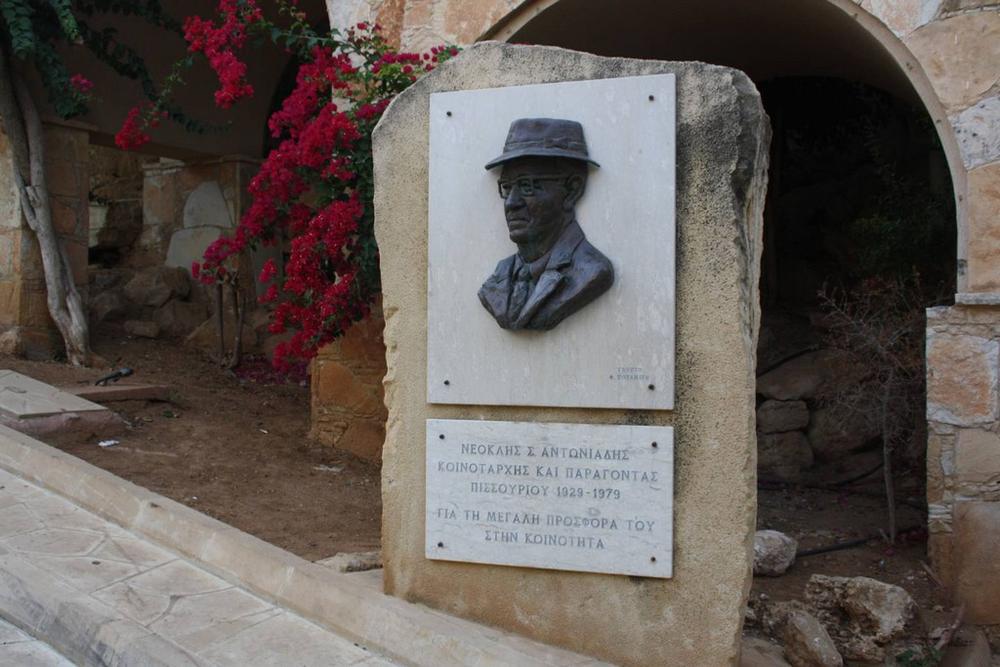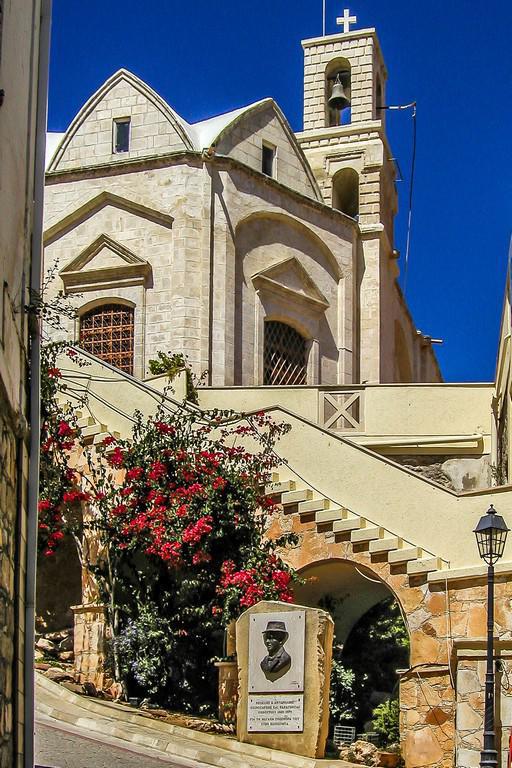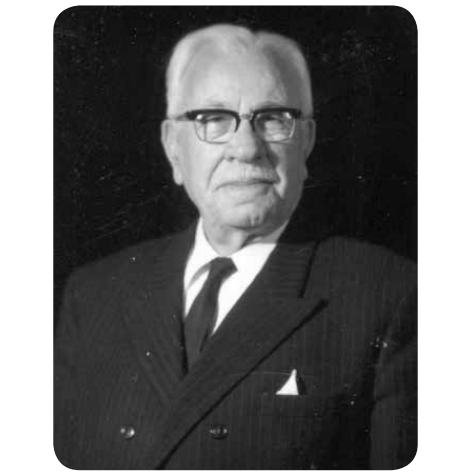Tourist Guide
Historical Monuments
back to categoryNeoklis Antoniadis Monument

This monument was created in memory of Neoklis Antoniadis, who was a Community Leader and an important factor in the history of Pissouri, honoring his multifaceted contribution to the community.
By Panos Razis Professor at the University of Cyprus
Neoklis S. Antoniadis was the Community Leader of Pissouri for fifty years, from 1929 to 1981. He was an honest, dignified and selfless man, who with his tireless efforts, works and the substantial support of his fellow villagers sealed the life and significant progress made in the village of Pissouri for decades. A progress that led to the continuous increase in the number of inhabitants of the village, in contrast to other villages in the province of Limassol. He was born in Morphou and was the son of Spyros Antoniadis and Paraskevi.
His grandfather, X’Antonis Antoniadis, from Kalo Chorio - Zoopigi in the province of Limassol, went to Egypt at a young age and when he grew up he worked as a chef in the Palace of the then Pasha of Egypt. When he became rich he returned to Cyprus around 1840 and opened a hotel with a friend on the seafront of Limassol, which even had the first billiards, hence until recently the relevant district was called the district of Billiards.
He married Smaragda, from Nicosia, with whom he had 5 daughters and 1 son, Spyros. Spyros was the leader of Limassol (during the Turkish occupation) and often defended the rights of the Greeks of the city against the arbitrariness and looting of their shops by the Turkish element. Once, defending a Greek bakerman near the Castle of Limassol, whose products were trampled on by the Turks , perhaps wanting to force him to leave the neighborhood, he fought with Pasha Kasum Kaimak and his 2 leaders, beating them and one of them and was left dead.
At his urging, he escaped to the Italian Consulate, where Frangoudis was consul, and from there, disguised, boarded a ship and settled in Naples, Italy. After these events, the Turkish raids on Ellinomachalas stopped and life in the old town was normalized. In Italy, Spyros acquired engineering knowledge, hence he has since been known as Spyros the Engineer.
In 1878, when Cyprus was bought by England, he returned, but did not catch up with his mother, who died, so he always brought great sorrow, leaving the typical beard for the time. He lived in the area of Morfou, where he built many wells and took care of the development of the irrigation system and the transport of water to the town. There he met and married with Paraskevi, with whom he had 3 boys, Plato, Euripides and the youngest, Neocles, and a girl, Styliani.
Neoklis Antoniadis grew up in a family that loved its Greek roots, our culture and fought for justice and meritocracy, always respecting and helping his fellow man and especially his later fellow villagers from Pissouri, who were entrusted to him for so many years. During his long tenure, Neoklis Antoniadis pioneered the planning and execution of many important projects for the then difficult time, which were crucial to the prosperity and development of the village:
1. He took care to bring the drinking water to Pissouri from Anogyra, buying the relevant source for 200 then pounds, a project that was a significant facilitation in the life of the villagers and relieved them from the diseases caused by the wells. In fact, he took care of the installation of taps at regular intervals and the excess water went to a tank for irrigation purposes and the creation of a garden.
2. After a study by consulted agronomists, he planted the first vines with the sultana variety in the areas of Tzoni and Laourou, introducing the vine and urging his fellow villagers to cultivate it instead of carobs and vegetables. With the sultanas' exports, Pissouri came out of obscurity and poverty. The beautiful and green landscape remained characteristic of the traveler, as he crossed the endless valley with the vineyards going from the old road from Limassol to Paphos.
3. He initiated the transfer of the electricity to Pissouri and to abandon the oil lamps that were used in the past, a project that was completed with many admitted difficulties, due to the large amount of money required.
4. He scheduled the surfacing of the roads of the village and the road from the beginning of the plain of Linidia to the bay of Pissouri at sea, at the old Customs. Believing that the bay could be used for tourism, as it really was, he persuaded then the Governor of Limassol and the officials of the English Bases to cover the relevant costs of the asphalt paving together with the village and to extend the water supply there.
5. He took care of the hygiene of the village, the management of sewage and water, the aesthetics and the cleanliness of the picturesque square and the other areas. Pissouri was awarded a large number of prizes for cleanliness and was known as the village with the characteristic white (whitewashed) walls of the houses.
6. He helped many of his fellow villagers to get scholarships or other help abroad, encouraging them to advance in their lives and professional careers. He also took care of their health and sent them to various doctors in the city, since Pissouri did not have any doctor's office with specialized doctors, not even a physician. In fact, he had some knowledge of medicine, since he liked to read a lot, giving injections to his fellow villagers, drops to treat eye injuries and gave quinine to those who suffered from malaria.
7. He took care of the creation of a slaughterhouse in the village and a community market, in order to eliminate the ugly spectacle with the hanging of the meat, which was dripping blood in a public place.
8. For 50 years as Community Leader, he did not receive a single penny that he was entitled to from his fellow villagers for his effort and for all the referral or other administrative documents that he had to prepare and submit to the various authorities and utilities of Limassol or beyond .
9. He was a member of the Committee of Hospitals and visited them together with the respective Prefect and Minister of Interior of the Republic of Cyprus, taking care of the completion of the arias of the province of Limassol.
10. He established a flour mill in Pissouri in which enough people came from the neighboring villages of the area to grind their wheat.
11. He always took care of claiming compensation from the English Bases for the damage they caused with their military exercises in the vineyards of his fellow villagers and in the other fields with the locusts and the olives. Out of respect for his personality, humanity and his objective judgment, the British finally stopped conducting exercises in Pissouri, looking for other areas. Neoklis Antoniadis married Anna, the daughter of the great teacher of the village, Ioannis Erotokritou, who gave him 3 children, Akis, Giannakis and Lenia. Fate, however, played a bad game on the tireless, always optimistic and hard-working Common Leader, after he lost his beloved wife to breast cancer when he was just 45 years old, on August 27, 1941.
He had an appeal to knowledge, he was an excellent hunter and he had insight into the political events of the place in difficult times. During the war against the English, he and a peaceful relative of his wife turned a secret cave into a hideout, where the fighters could go to rest and find food.
He was a member of the 100-member Supreme Council of the United Party of the former President of the Republic Glafkos Clerides, of whom he was a personal friend. As a Common Leader,by all the villagers without exception, who respected and honored him regardless of party affiliation and choice. He loved Greece and its ancient culture with all that it contributed to Europe and the world.
Neoklis S. Antoniadis passed away in 1986, full of days, leaving behind his three children, who became famous in society and continued the legacy he left them: love for the homeland and fellow human beings, justice and dignity. They produced 8 grandchildren and 21 great-grandchildren. His bust is located on the street near the village church, just opposite his house at the end of the village square and next to the Lamprianideio Library (donated to the village by his sister-in-law, Lenio Lamprianidis, in memory of Lambros Lambrianidis's husband, who helped him raise his three children after he lost his wife). The Library now houses the offices of the Community Council of Pissouri.



